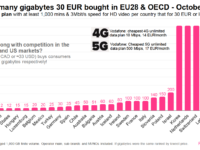The cost of wireless services emerged as a political issue during the recent national election, with most parties taking turns promising measures to increase competitiveness and lower consumer costs. The Liberals based their platform on a commitment to reduce costs by 25 per cent over the next two years, a measure that some analysts suggested had already been met. I argued that the 25 per cent reduction target was measuring the wrong thing, noting that “the 25 per cent price decline may sound attractive, but if other countries experience declines of 30 per cent or 40 per cent, it means that Canadians would actually be paying even more relative to consumers elsewhere.”
Archive for October 30th, 2019

Law Bytes
Episode 231: Sara Bannerman on How Canadian Political Parties Maximize Voter Data Collection and Minimize Privacy Safeguards
byMichael Geist
March 31, 2025
Michael Geist
March 24, 2025
Michael Geist
March 10, 2025
Michael Geist
Search Results placeholder
Recent Posts
 The Law Bytes Podcast, Episode 231: Sara Bannerman on How Canadian Political Parties Maximize Voter Data Collection and Minimize Privacy Safeguards
The Law Bytes Podcast, Episode 231: Sara Bannerman on How Canadian Political Parties Maximize Voter Data Collection and Minimize Privacy Safeguards  The Law Bytes Podcast, Episode 230: Aengus Bridgman on the 2025 Federal Election, Social Media Platforms, and Misinformation
The Law Bytes Podcast, Episode 230: Aengus Bridgman on the 2025 Federal Election, Social Media Platforms, and Misinformation  The Law Bytes Podcast, Episode 229: My Digital Access Day Keynote – Assessing the Canadian Digital Policy Record
The Law Bytes Podcast, Episode 229: My Digital Access Day Keynote – Assessing the Canadian Digital Policy Record  Queen’s University Trustees Reject Divestment Efforts Emphasizing the Importance of Institutional Neutrality
Queen’s University Trustees Reject Divestment Efforts Emphasizing the Importance of Institutional Neutrality  The Law Bytes Podcast, Episode 228: Kumanan Wilson on Why Canadian Health Data Requires Stronger Privacy Protection in the Trump Era
The Law Bytes Podcast, Episode 228: Kumanan Wilson on Why Canadian Health Data Requires Stronger Privacy Protection in the Trump Era

